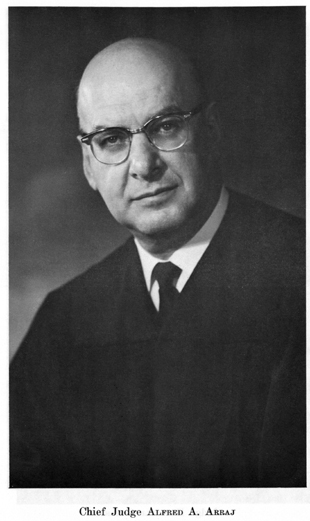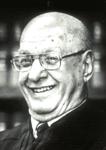 Alfred A. Arraj was born in Kansas City, Missouri on September 1, 1906. His family moved to Colorado in early 1907, where he spent most of his boyhood in Swink, Colorado.
Alfred A. Arraj was born in Kansas City, Missouri on September 1, 1906. His family moved to Colorado in early 1907, where he spent most of his boyhood in Swink, Colorado.
As a small boy, he dreamed of becoming a prosperous farmer and driving a Buick. As a teenager, he picked berries and worked behind a soda fountain. He lost both jobs because he ate too much of the inventory. Later he and his brother Joe, along with their cousin George Michael, started a bicycle repair shop. Having no discernible mechanical aptitude, Alfred was consigned to keeping the books and drumming up business. He skipped a grade in school and joined Joe at Swink High School. Together the Arraj boys comprised half of the graduating class. Arraj enrolled at the University of Colorado in 1923 at the age of sixteen and graduated in 1928 with a degree in Law. While a student in Boulder, he met two of the most significant people in his life- his lifelong friend, Gordon Allott, and his future wife, Madge Louise Connors.
He met Madge at a sorority tea dance on the CU campus when she was a freshman. Three years later, on November 12, 1929, they married. Following his admission to the Colorado bar, Alfred took a position with a Denver law firm "earning a lavish $15.00 per week." It wasn't enough, in his view, on which to get married so he headed back to Swink in his Model-T Ford he had named "The Blue Duke." He found a job with a lawyer in Springfield, Colorado in the extreme southeast corner of the state for the grand sum of $200 per month. Within six weeks the lawyer, D.G. Reynolds, made Alfred his partner. The young lawyer practiced with Reynolds and on his own for nearly twenty years.
While in private practice, he also served as Baca County Attorney on a part-time basis from 1936 until he reported for military service in 1942. On Tuesday, December 9, 1941, Alfred and two of his closest friends, Gordon Allott and Jimmy Wagner volunteered for military service. Alfred enlisted in the U.S. Army Air Corps and served for 40 months, mostly in the China-Burma-India theater. He rose from First Lieutenant to Major when he commanded the 129th AACS Squadron, First Tactical Group. He was awarded three battle stars. Major Arraj returned to civilian life at age 39 and resumed his position as Baca County Attorney. Major Gordon Allott returned to Lamar, Colorado and was soon elected District Attorney of the state's Fifteenth Judicial District. Baca County was in the same district and Alfred received an appointment from Allott as a Deputy District Attorney.
In 1947, the Arrajs' only child, Sally, was born. Deputy District Attorney Arraj confided in Allott that he wanted to be a judge. Ever attentive to his friend, Allott advised him that the District Judge resident in Lamar was going to retire. State judges were elected in Colorado at that time. Alfred announced his candidacy for the district court judgeship before most people had heard of the upcoming vacancy. Alfred ran against a popular state senator for the Republican nomination and surprised everyone with his victory in the primary. He won in the general election in November 1948, becoming the only state district judge in the largest one-judge district in the state. His district was so large, the Arrajs decided in 1953 to move fifty miles north from Springfield to Lamar so that "the Judge," as he was ever after known, would be near the center of the district. By this time, Allott had been elected Lieutenant Governor of Colorado and in 1954 was elected to his first of three terms as United States Senator. As with many who embark upon a judicial career, Judge Arraj was confronted with a serious backlog of over 300 pending cases. Unlike some, however, the Judge rolled up his sleeves and went to work.
By the beginning of 1957, there were a mere 132 cases on the docket and he had disposed of 2,762 cases. Judge Arraj's reputation as a diligent, hard-working judge became known throughout the state due to his involvement in Republican politics and his work with the Colorado Bar Association. In 1954, he was elected Senior Vice President of the CBA and President of the Colorado State District Judges Association. Congress that year had created a new federal district court judgeship. Not coincidentally, Judge Arraj's name was mentioned in the newspapers as a possible candidate. Jean S. Breitenstein, however, was eventually selected. Not long after taking office in the same year, Senator Allott began campaigning in Washington for a third U.S. District Court Judge for Colorado. By June of 1956, the Judge was again mentioned in the newspapers as a "strong candidate for the appointment in the event the bill creating the additional judgeship should become law." The bill failed to pass, but in June 1957, Judge Breitenstein was appointed to the Tenth Circuit Court of Appeals creating a vacancy on the district court bench. On June 21, 1957, The Denver Post ran a story naming possible candidates to fill the vacancy, Judge Arraj being one of the named candidates. The Post opined that Judge Arraj was the front-runner, but stated there was one factor working against his selection. Specifically, the Post said, it was Denver's "turn" to have a judge on the federal bench. The Post also predicted that the "[s]election of Breitenstein's successor won't come for months." President Eisenhower nominated Judge Arraj on July 2, 1957. The nomination was confirmed by the Senate on August 5. His oath of office was administered on August 30, two days before his fiftieth birthday, by Chief Judge Orie Phillips of the Tenth Circuit Court of Appeals.
The Judge started work and a short time after was forced into a leadership position. He became Chief Judge on December 12, 1959 when Judge Knous unexpectedly passed away. Judge Arraj served as Chief Judge of the District of Colorado for more than sixteen years, until he took senior status on August 31, 1976, the day before his 70th birthday. In 1964, Arraj was elected by the judges of the circuit as the District Judge representative for the Tenth Circuit to the Judicial Conference of the United States. He served on several committees of the Conference and as an instructor at seminars for newly appointed judges. From 1974 through 1976 he served on the board of directors of the Federal Judicial Center. He was appointed by Chief Justice Warren Burger as one of only ten judges in the nation to oversee the off-bench activities of all federal judges. When the Judge took his oath of office, he promised to administer justice "punctually." He had demonstrated success as a state trial judge in reducing the backlog of cases he had inherited and immediately set out to do the same in federal court.
He worked efficiently, consistently and "punctually" from the onset. In 1966, he devised an ambitious plan to dispose of the backlog. He used all five district courtrooms in the new Byron Rogers courthouse during a six-week intensive trial calendar. At the time there were only three district judges; Hatfield Chilson and William E. Doyle were the others. Judge Arraj arranged for six out-of-state judges to hear cases for one or two weeks each during the six-week session. This special session was an innovation in federal district courts. The "logjam" of cases was cleared and the Arraj plan was thereafter used in other districts. By 1971, the press was hailing the U.S. District Court for the District of Colorado as a "model" for other courts to emulate. The average wait for a criminal trial was thirty days from the time of arrest to the trial. Judge Arraj acknowledged that this short time period was due to the judges "pushing," which did not enhance his popularity with the bar. The Judge, however, did not care if he was popular with the bar because, as he said, he was not "in a popularity contest." "Justice delayed was justice denied," he opined. Later that year, when Chief Justice Warren Burger came to Denver for a judicial conference, he praised Arraj as a "strong chief judge" and the federal district court in Colorado as a "strong bench." By the time he took senior status in 1976, the district court was recognized as one of the most efficient in the nation. Among more than 90 federal courts, it was routinely near the top of the list in efficient use of jury time and in providing prompt trials in both civil and criminal cases. The price for these achievements was unrelenting hard work.
 The Judge was so committed to the speedy and efficient administration of justice during his 35 year tenure, he took very little time off from work and, aside from devoted attendance at CU football games, he participated in very few leisure activities. The Judge was even quoted one time saying, "I've taken seven days, in the last fourteen years." He was named one of the nation's most hard-working judges in The Benchwarmers, a 1974 book about federal judges. Once Arraj took senior status, he tried as many cases as before. He worked every day until two weeks before his death on October 23, 1992 at the age of 86. On July 26, 2000, Congress named the new federal courthouse in Denver the Alfred A. Arraj United States Courthouse. It is a lasting tribute to this gentle servant of the law who was prized locally and praised everywhere.
The Judge was so committed to the speedy and efficient administration of justice during his 35 year tenure, he took very little time off from work and, aside from devoted attendance at CU football games, he participated in very few leisure activities. The Judge was even quoted one time saying, "I've taken seven days, in the last fourteen years." He was named one of the nation's most hard-working judges in The Benchwarmers, a 1974 book about federal judges. Once Arraj took senior status, he tried as many cases as before. He worked every day until two weeks before his death on October 23, 1992 at the age of 86. On July 26, 2000, Congress named the new federal courthouse in Denver the Alfred A. Arraj United States Courthouse. It is a lasting tribute to this gentle servant of the law who was prized locally and praised everywhere.